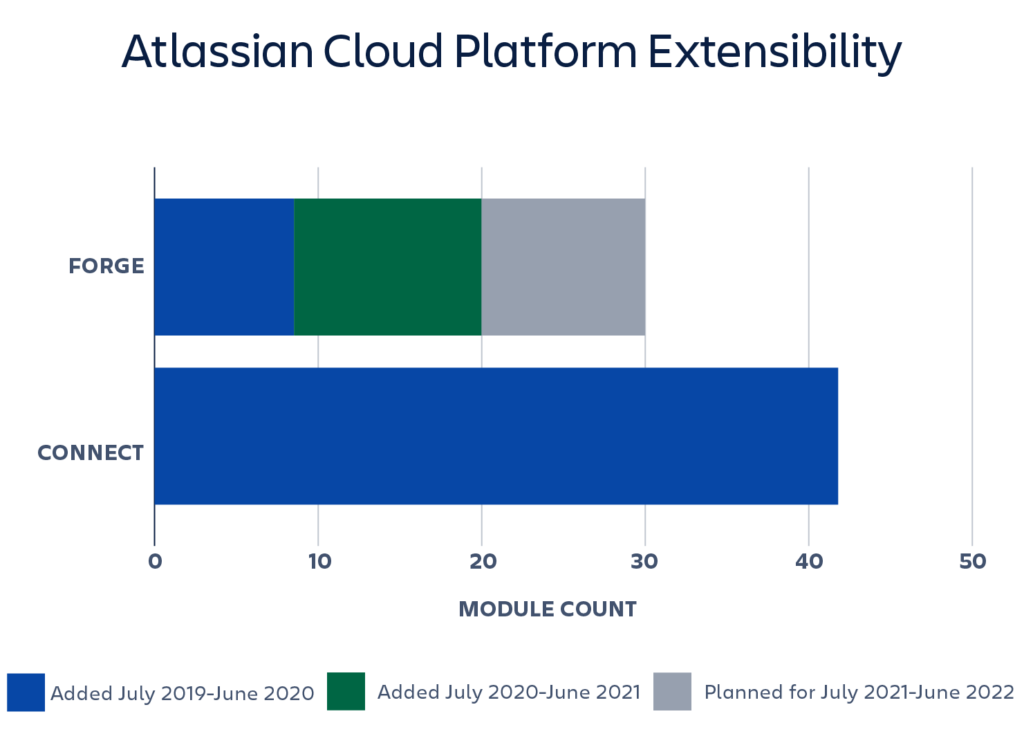Hello, developer community! I'm Jordan, a Product Manager on the Forge team, here to share an extensibility update.
Given that Forge reached general availability earlier this year and continues to rapidly evolve, we want to provide a snapshot of the current state of extensibility with Forge, particularly when compared with Connect, the cloud extensibility framework that many Atlassian apps have historically been built upon.
For those new to the ecosystem, Forge is our latest cloud app development platform designed to unleash innovation in the form of apps built on Atlassian's growing portfolio of products. Unlike Atlassian Connect, Forge operates on an Atlassian-hosted infrastructure, meaning that you can leave us to handle your app's storage, security and privacy with confidence.
We know many developers have wondered whether their new app ideas can be built with Forge in its current state, or if their app still needs to be built in Connect. In this post, we're going to share our progress in expanding Forge's extensibility and some resources to help you keep track of which endpoints are available in Forge versus Connect.
Our philosophy for prioritizing extension points
The community of 25,000+ developers and 1,000+ Marketplace Partners already using Connect have provided important data insights, allowing us to observe which features currently provide the greatest impact for both developers and end users.
In order to benefit both builders and users of Atlassian apps, we are harnessing this data to ensure that the decisions made around which extension points to deliver next are equitable and well-rounded. By combining analytics of builder and user usage for each module, we have established a process of measuring 'effective coverage' that allows us to quantify our extensibility parity between the Forge and Connect platforms. By prioritizing modules that maximize this metric, we build the endpoints that provide the greatest value for both developers and users.
Forge's extensibility growth, by the numbers
Within the past 12 month’s Forge's extensibility has increased by 122% – we've added 11 new Forge extension points to unlock more experiences that can be built for Jira and Confluence. Many of these were previously only available in Connect. With 20 Forge modules in total, more apps than ever can be built with Forge, including some that previously could only be built with Connect.
As of today, over 55% of existing Connect apps use modules that already have an equivalent in Forge. The list of these Forge and Connect parallel extension points has recently been published in our official documentation, which you can find here.

Tip
The Connect module equivalents page is particularly useful if you're familiar with Connect but are experimenting with and starting to learn more about Forge. It also includes a list of upcoming modules on our engineering roadmap.
What’s important to note is that Forge and Connect modules are not mirrored exactly – in some cases, a single Forge module can do the work of two or more Connect modules. This means fewer, more powerful modules in Forge that are simpler to keep track of and maintain in your app.
Assessing this progress against our measure of effective parity as defined above, we are proud to have almost 70% extension point coverage in comparison to Connect when we consider builder and user usage. In other words, Forge is ready to be the go-to platform for the majority of use cases.
Ensuring continuous growth of the Forge platform
Our ambitions for Forge far exceed the scope of any Atlassian platform to date, and the significant progress we've made over the past 12 months is a precursor to many more future enhancements. We currently have plans to build Forge equivalents for 10 more of the most used Connect modules – details of these can be found in our 'what's coming’ page. Once delivered, this will push Forge's effective extensibility parity with Connect to above 85%, and we will continue to add more extension points which were not available in Connect.
We are also eagerly exploring how Forge can be used to extend other products in the Atlassian lineup, opening the door for builders and users to explore a whole new range of exciting opportunities.
Most importantly, we want to hear what you want to see next from Forge! The Forge team and I are happy to answer questions about our roadmap, prioritisation, or the modules already delivered on our Forge developer community forum here.
